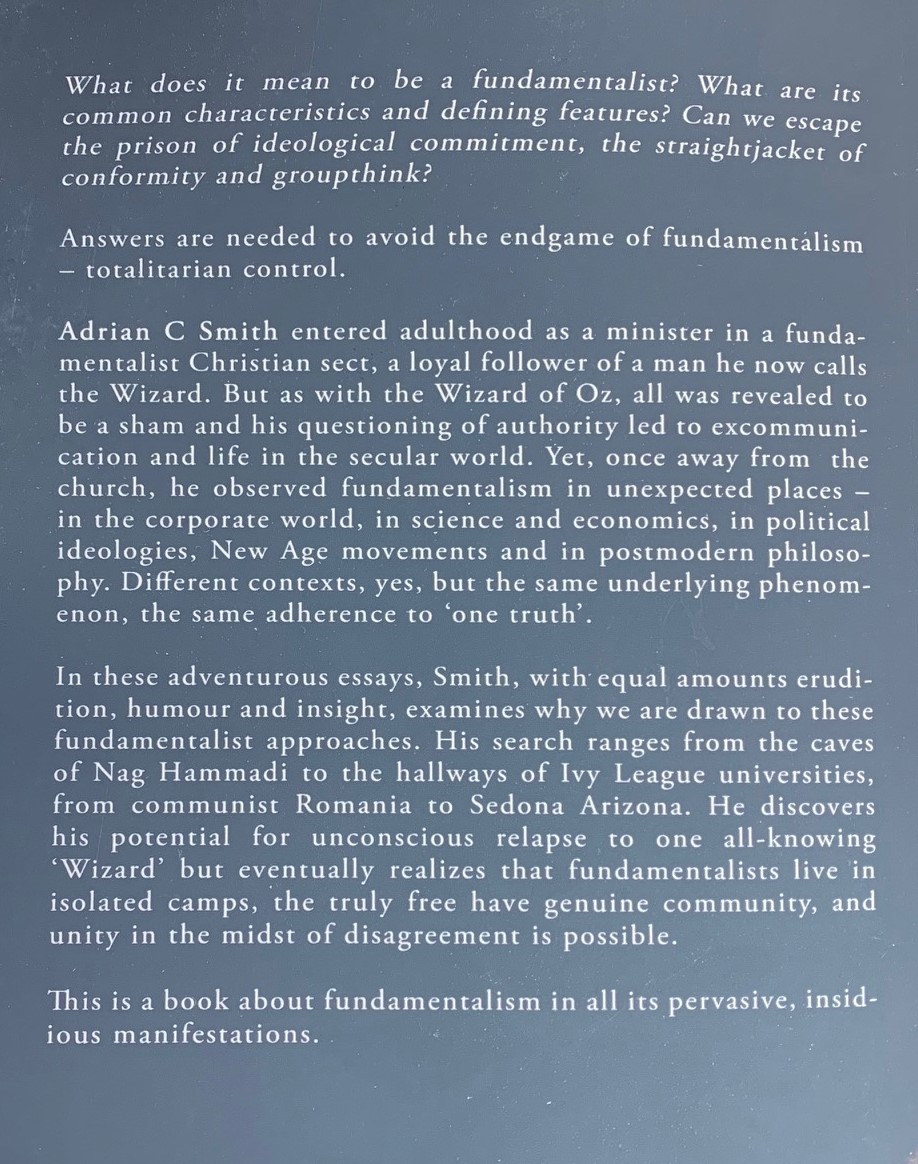|
home | what's new | other sites | contact | about |
|||||
|
Word Gems exploring self-realization, sacred personhood, and full humanity
Foreword Adrian Charles Smith
Reading the hopeful and inspiring message contained within Soulmate Myself, I recall with amusement the nineteenth century philosopher, Schopenhauer, aptly named, “the pessimist.” Schopenhauer insisted that we fall in love, not from choice or compatibility but unconsciously driven by nature’s own desire to produce “balanced children.” All of us are somewhat un-balanced; too short, too tall, too shy, too aggressive, and so on. Some people have noses that are too long, so a man with a long nose could fall head-over-heels for a woman with a button nose without realizing what was happening to him. Without this balancing function, extreme characteristics would be exacerbated to the detriment of the species. In this view of things, Nature doesn’t really care how you feel. She has her own purposes. Needless to say, Schopenhauer had trouble with the ladies. Although a deep thinker and a great philosopher, he remained un-schooled in the fine art of romance. His view of romantic love and attraction was merely a reflection of his pessimistic view of life in general: “We can regard our life as a uselessly disturbing episode in the blissful repose of nothingness.” Fortunately, Wayne did not succumb to the skepticism of Schopenhauer concerning romantic love. After 1000 pages and 20 years of consideration, the author’s view has evolved in the direction of a metaphysical understanding, finding our soulmate not through “the perfect resume” but rather the mystical concept -- “soulmate, myself.” Our true love awaits us at some place and some time because he/she is literally our missing half from which we were split because of our descent into matter. Reunion with that one person, unique amongst all others, will be an inevitable consequence of our journey home. Physicist David Bohm discovered that elementary particles remain forever united even though separated at the furthest reaches of the universe. Spin one particle, and its twin will respond, regardless of distance. Separation is an illusion of the “explicate order,” but unity is the underlying reality of the ”implicate order.” In words attributed to Jesus, “What therefore God hath joined together, let not man put asunder” (Mark 10). I tend to interpret this verse symbolically, as a statement of ultimate reality, rather than literally, as a prohibition against divorce. In the underlying reality of the ‘implicate order,’ the separation of two aspects of the same soul cannot be thwarted. Reunion with our soulmate cannot be prevented by time or circumstances. We will be drawn to our true love in this life or the next, "not for a reason," but by a mystical force akin to gravity or magnetism. Reunion will happen, must happen, when we are ready for it. Scientists tell us the entire universe was once compressed into a space smaller than the head of a pin. The big bang thrust its constituent parts in an ever-expanding outward direction, and this will continue until the whole process is reversed by the opposing force of gravitational attraction. That which is separated must eventually be re-united. In the Book of Genesis, Woman is taken from Adam’s rib. She is part of him, “bone of my bones and flesh of my flesh,” a missing part, “soulmate, myself.” I tend to think that Wayne’s concept of romantic love is a metaphor for our larger condition. All spiritual traditions treat the reality of this world as some form of deeply flawed illusion, a pale imitation of an underlying reality. “Love not the world,” the New Testament teaches, for “all that is in the world, the lust of the flesh, and the lust of the eyes, and the pride of life, is not of the father but of the world.” (1 John 2:16) In the world we experience life as a fragment of our former selves, forever plagued by a sense of separation and abandonment which belies the underlying reality of the implicate order. Plato likened our condition to cave dwellers sitting with their backs to the cave entrance watching shadows on a wall. They do not perceive the ultimate reality of the world outside, only shadows. In Gnostic myth, the goddess Sophia strayed too far from the galactic core unaccompanied by her consort, the Christos, whom she foolishly left behind. Thus, separated from her love, she became confused and disorientated, giving birth to a false god, the god of this world, the demiurge – literally “half maker.” The demiurge fashions the world from Sophia’s divine substance much as a carpenter would build a house from materials at hand; but he weaves into the creation his own flawed nature. Now all creation awaits redemption, Sophia’s reunion with her consort. Avowed Gnostic, Philip K. Dick, science fiction writer and author of various works popularized in films such as “Blade Runner,” “Minority Report,” and “Total Recall,” describes his own Gnostic theology this way: “Each of us has a divine counterpart unfallen who can reach a hand down to us to awaken us. This other personality is the authentic waking self; the one we have now is asleep and minor. We are in fact asleep, and in the hands of a dangerous magician disguised as a good god, the deranged creator deity. The bleakness, the evil and pain in this world, the fact that it is a deterministic prison controlled by the demented creator causes us willingly to split with the reality principle early in life, and, so to speak, willingly fall asleep in delusion.” (from Exegesis by P.K. Dick) Having split with the reality principle early in life, and having fallen asleep in delusion, we are now making our way back home. A necessary part of that return will be reunion with our other half, in this life or the next, in order that two together might assist each other on the path of evolution. This is the message of Soulmate Myself. Perhaps the deep pessimism of Schopenhauer was not unwarranted, only incomplete. He saw the bleakness of the world but not the bright sunshine at the cave’s entrance. In the world we see many counterfeit versions of romantic love – the co-dependencies, the torrid love affairs which fail to stand the test of time, the unholy bargains where we covet in the other what we lack in ourselves. Thousands of years of carnal embrace have failed to fill the void. This is the false construct of the demiurge, a counterfeit of the real thing, a shadow on the wall. The word “consort” describes something quite different; two autonomous souls coming together as equals to assist each other on the path. Perhaps we will find our soulmate when we no longer pursue her/him from a sense of neediness. Sophia’s redemption, reunion with her consort, gives rise to “a new heaven and a new earth.” The metaphor of “a bride adorned for her husband” is embedded in the Christian tradition as well. The ecstatic condition of lovers re-united is descriptive of the ultimate reunion. “And I saw a new heaven and a new earth: for the first heaven and the first earth were passed away; and there was no more sea. And I John saw the holy city, new Jerusalem, coming down from God out of heaven, prepared as a bride adorned for her husband. And I heard a great voice out of heaven saying, Behold, the tabernacle of God is with men, and he will dwell with them, and they shall be his people, and God himself shall be with them, and be their God.” (Revelation 21)
Adrian Charles Smith, J.D. Midway aprisonforthemind.blog
|
|||||
|
|


